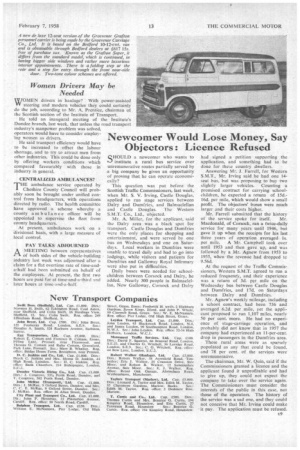Newcomer Would Lose Money, Say Objectors: Licence Refused
Page 57

If you've noticed an error in this article please click here to report it so we can fix it.
SHOULD a newcomer who wants to institute a rural bus service over unremunerative routes partially served by a big company be given an opportunity of proving that, he can operate economically?
This question was put before the Scottish Traffic Commissioners, last week, when Mr. S. V. Irving, Castle Douglas, applied to run stage services between Dairy and Dumfries, and Balmaclellan and Castle Douglas. The Western S.M.T. Co., Ltd., objected.
Mr. A. Miller, for the applicant, said the Dairy area was a black spot for transport. Castle Douglas and Dumfries were the only places for shopping and entertainment, and were served by one bus on Wednesdays and one on Saturdays. Local workers in Dumfries were unable to travel daily and had to go into lodgings, while visitors and patients for Dumfries and Galloway Royal Infirmary were also put in difficulties.
Daily buses were needed for schoolchildren between Corsock and Dairy, he added. Nearly 300 people in BalmaclelIan, New Galloway, Corsock and Dalry
had signed a petition supporting the application, and something had to be done for these country dwellers.
Answering Mr. J. Farrell, for Western S.M.T., Mr. Irving said he had one 14seat bus, but was proposing to buy two slightly larger vehicles. Counting a promised contract for carrying schoolchildren, he expected a return of 15d.16d. per mile, which would show a small profit. The objectors' buses were much larger and their costs higher.
Mr. Farrell submitted that the history of the service spoke for itself. Mr. Macdonald, of Corsock, ran a twice-daily service for many years until 1946, but gave it up when the receipts for his last three years of operation averaged Is.
per mile. A Mr. Campbell took over until 1953 and then gave up, and was followed by a Mr. Agnew from 1953 to 1955, when the revenue had dropped tc 9.56d.
At the request of the Traffic Commissioners, Western S.M.T. agreed to run a reduced frequeney, and their experience was a return of 3d. per mile on the Wednesday bus between Castle Douglas and Dumfries, and 17d. on Saturdays between Dairy and Dumfries.
Mr. Agnew's weekly mileage, including a school contract, had been 736 and averaged 6.2d. per mile, yet the applicant proposed to run 1,107 miles, nearly 50 per cent. more. He had no experience of stage-carriage operation, and probably did not know that in 1957 the company had experienced an 11-per-cent. drop in passengers in the Dumfries area.
These rural areas were as sparsely populated as any that could be found, and 78 per cent. of the services were unremunerative.
The chairman, Mr. W. Quin, said if the Commissioners granted a licence and the applicant found it unprofitable and had to give up, they could not expect the company to take over the service again. The Commissioners must consider the interests of the public in this case, not those of the operators. The history of the service was a sad one, and they could not conceive that Mr. Irving could make it pay. The application must be refused.
































































































































